It has been 8 years since I have been to Africa so I decided it was time to go back. Having already seen the West and the North, experiencing the offerings and animals of East Africa seemed like a logical next exploration area on the world’s second largest continent. I chose Nairobi, Kenya as my entry and exit point.
**Reader side note: As I type this I am currently in the Masai Mara, Kenya’s famed national park. It is the home of the great wildebeest migration (which happens to be going on right now). From my current bed’s view, I can glance up to see elephant’s peacefully grazing in the distance, hippos doing what hippos do – quite noisily – in the pool below as well as witness an annoying swallow fly in and out, in and out of my room. I think she wants to nest in the conical structure of my roof. Ugh. **
Nairobi is ugly, jarring, sprawling, traffic congested and overwhelming in its seemingly unwalkability. It is also quite easy to feel stranded after arriving at a location because finding good enough wifi to get an Uber home can be nearly impossible (clearly this happened a few times to me). In a word Nairobi is exhausting. It probably didn’t help that I chose the WORST neighborhood in which to rest my blond hair, blue eyed head, Kirinyaga Road (anyone from Kenya just gasped after reading that). And while my 5 nights there were sufficient for a lifetime, they weren’t completely void of charm and unforgettable moments. One in particular was my tour of Nairobi’s downtown streets led by 3 former street kids, Cheedaz, Donga and Kissmart.
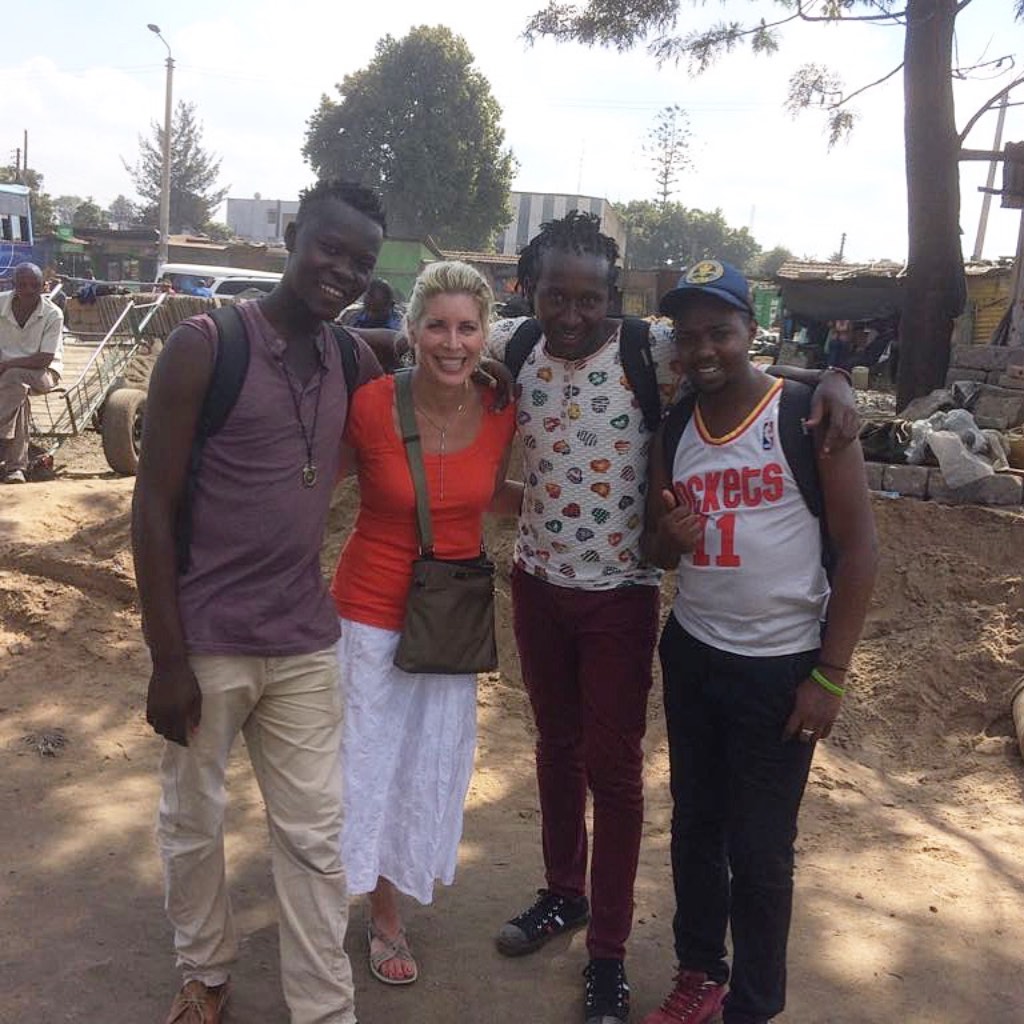
Donga, Me, Kissmart and Cheedaz in downtown Nairobi!
I met them at the tour meeting point near the Hyatt in uptown. This was considered the “posh” part of central Nairobi, and while I initially didn’t understand how it was considered that given the tattered buildings, filth and litter, I quickly did when we crossed over into downtown.
Cheedaz, Donga and Kissmart all introduced themselves and gave me a briefing on what was to be a private tour. Their most important objective was that I felt safe while I walked through the streets where they raised themselves. To this end, one was always at my side while the other two were either in front or back of me. It was like I had my own personal security detail for the 3.5 hour tour duration.
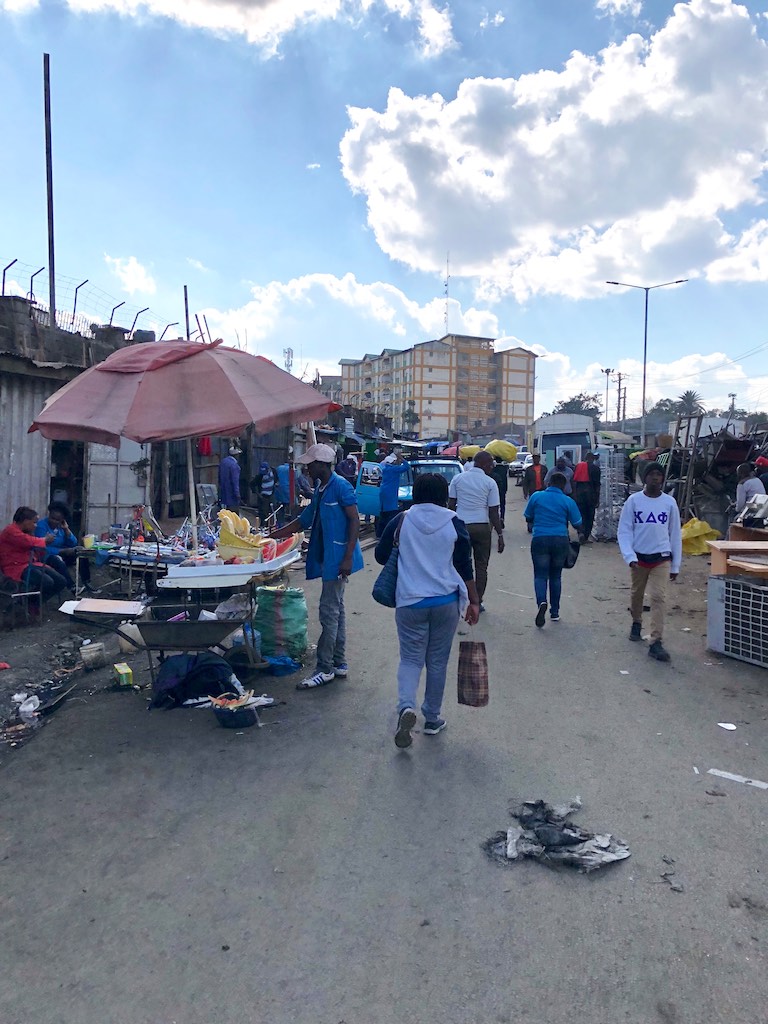
Streets of Nairobi.
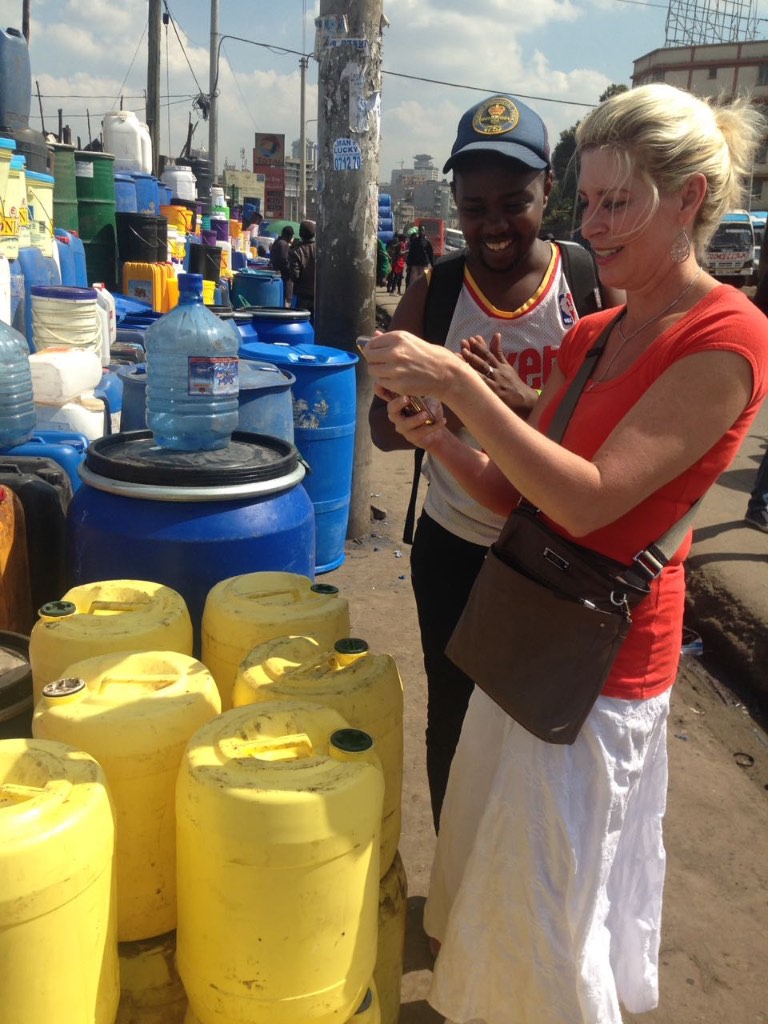
Cheedaz and me!
I am showing Cheedaz a picture of him shopping for one of these plastic water bottles. Nairobi is a city of over 3 million, and 1.6 million live in a nearby slum called, Kibera. Each household has to carry water from a local source to their shanty home (which can house 8 -15 souls). Water jugs like this are imperative to slum life.
Cheedaz was my first escort.
Walking from uptown to downtown, a commotion started around us. People started yelling and a large crowd amassed around something. At first we couldn’t see or understand what was going on. But as we were maneuvering away, we saw a young boy, likely 12 – 13 years old, in the center of all the angst. He was being beaten by anyone who could get within arms length. One woman was being particularly aggressive.
Cheedaz, with his hand on my shoulder calmly guided me beyond the crowd and said, “The same thing happened to me. I will tell you about it.”
He said, “That boy is a street kid. He stole that lady’s cell phone. She yelled when it happened and the crowd is now finding justice. He could die because the police are not arriving.” My breath left me. The whole scene was so surreal to me, yet so familiar to Cheedaz.
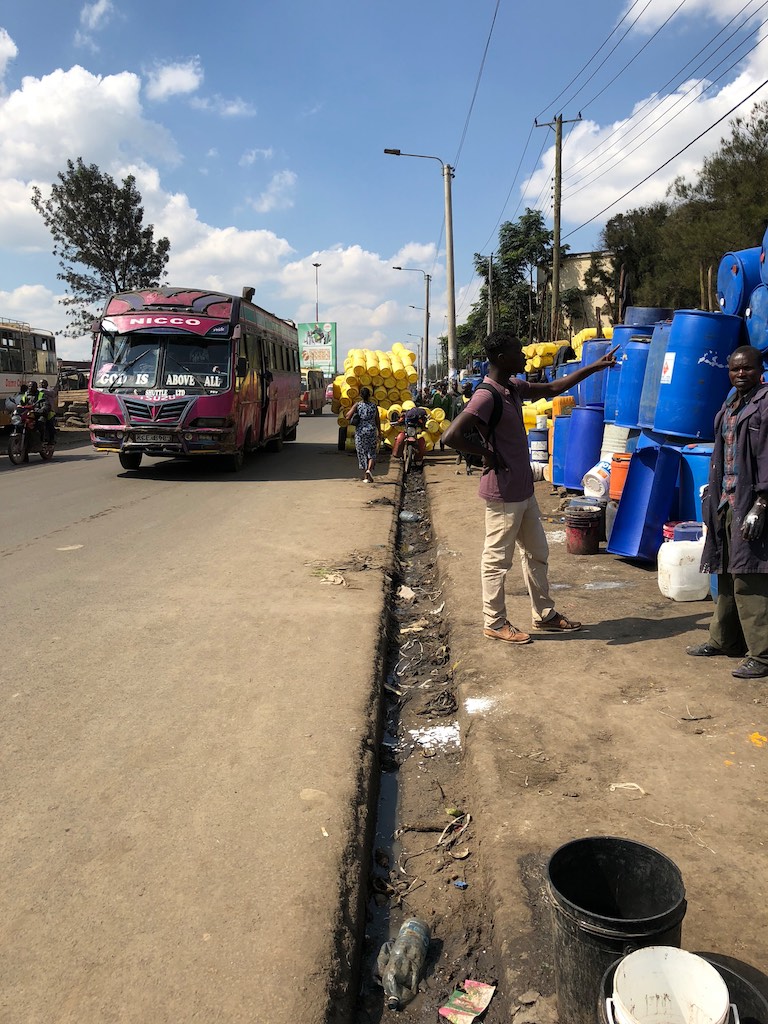
That is Dongo checking out the water jugs!
Cheedaz’s Story:
Cheedaz became a street kid when he was 9. He started in a stable family. His mom was the second wife of a truck driver (polygamy is common to the culture here in Kenya…to lots of Africa, really). He had a younger sister and went to public school.
His world changed, however, when his father died in a work related car crash when he was 8. Because the first wife is considered “queen” in this culture, after his father’s death she came in and took all of Cheedaz’s family possessions and money. His mother, overwhelmed with grief and despair, did her best to learn a skill to support the family, but the amount of stress was too much to bear. She became an alcoholic, which according to Cheedaz, led to tuberculosis and a permanent stay in the hospital. His sister was sent to stay with his aunt, but the aunt refused to take Cheedaz. He would only be an extra mouth to feed while his sister could help with household duties. Cheedaz’s only option was the street.
His first year he learned to be an adept begger, charming the women and men as they boarded buses at a local bus stop for a few shillings here and there. But as he got older, his targets found him less endearing so he needed a new income source. Stealing cell phones became his next gig.
In the streets he bonded and created family with other street kids. At nighttime, 16 of them would huddle together to keep warm during the cold Nairobi nights which are common in this higher altitude city.
By the time he was 15, Cheedaz graduated beyond cell phones to bag snatching. He would target crowded busses during heavy traffic. But one day not all went as planned.
Much like the scene with the boy Cheedaz and I witnessed, Cheedaz stole a woman’s hand bag who did not remain silent about it. She jumped off the bus and started screaming. Cheedaz said, “Cell phones were easy to hide in my pants, but I couldn’t hide the bag so I was quickly spotted.” Men started running after him. One tagged his leg which led him to fall to the ground. The crowd descended upon him and started beating him with their fists, rocks and sticks.
The rage of the crowd was so great that they tied his hands and feet and lead him to a cylindrical stack of tires into which they planned to drop him. The next step was to douse him in petrol and light the entire structure on fire.
Had it not been for a few patrolling police officers that day, Cheedaz’s story would have ended tragically and dramatically. The intensity of the crowd was so great that the officers had to fire many shots in the air to disperse them. After everyone fled, Cheedaz was brought to jail.
Cheedaz still has scars and crooked teeth from the events of that afternoon, but his spirit was unwaivered.
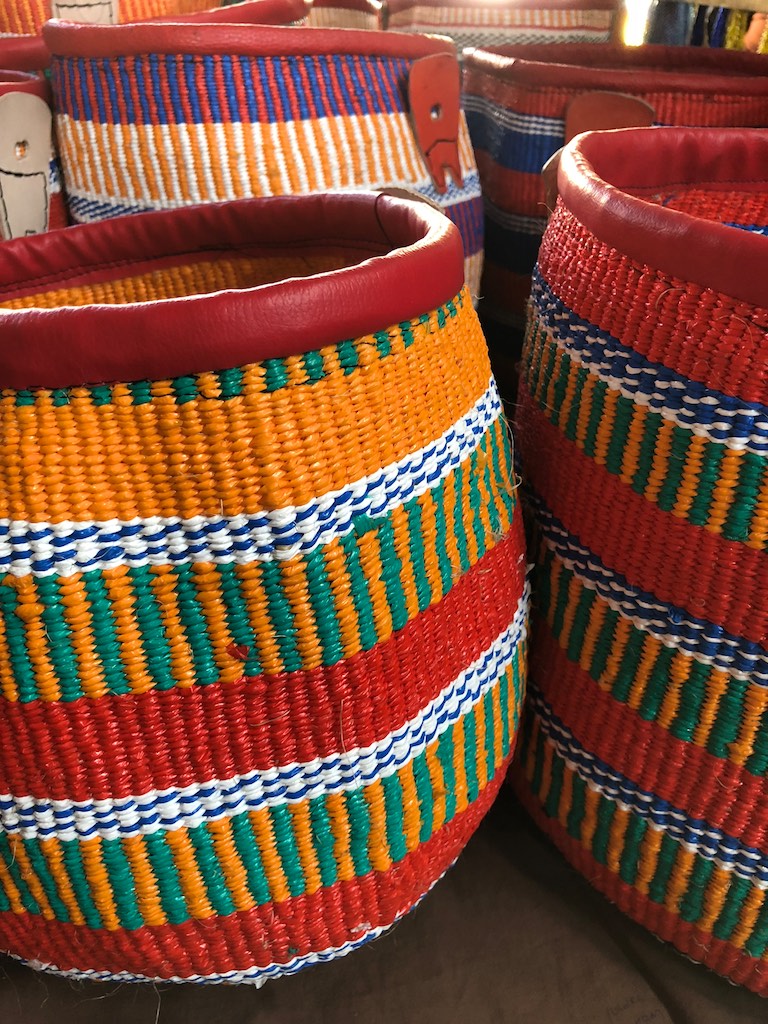
One of the stops along the tour was to Kariokor Market. This was definitely not a tourist market. In fact many of the locals buy from this market to bring goods to bigger, more famous markets in Nairobi. I loved the colors and overly rustic vibe. The dirt floor was so uneven and washed out from rain that I couldn’t get too distracted by the beautiful handcrafts in the stalls. Watching my step was imperative to getting out of there without a sprained ankle.
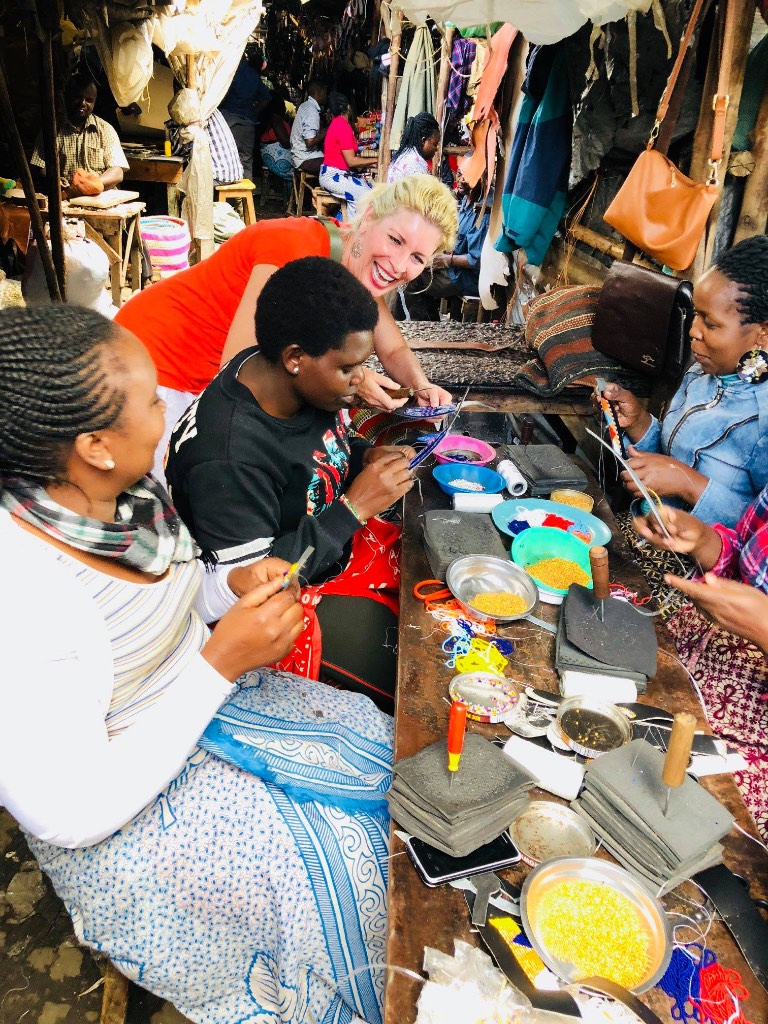
These are Masai women in the market making hand-beaded decorative details that will be used to adorn leather sandals that are famous in the region. Each beaded element takes these patient women 4 days to bead onto a leather backing. They are then passed on to men who complete the sandal using hand cut and sewn leather.
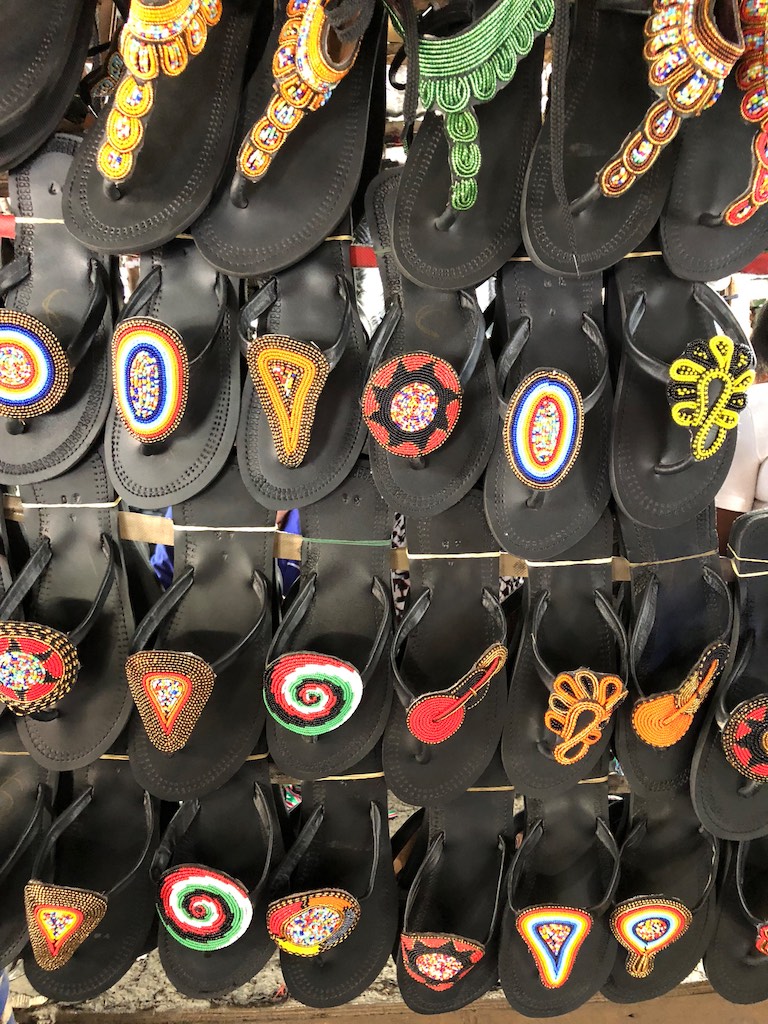
Some of the finished masterpieces!
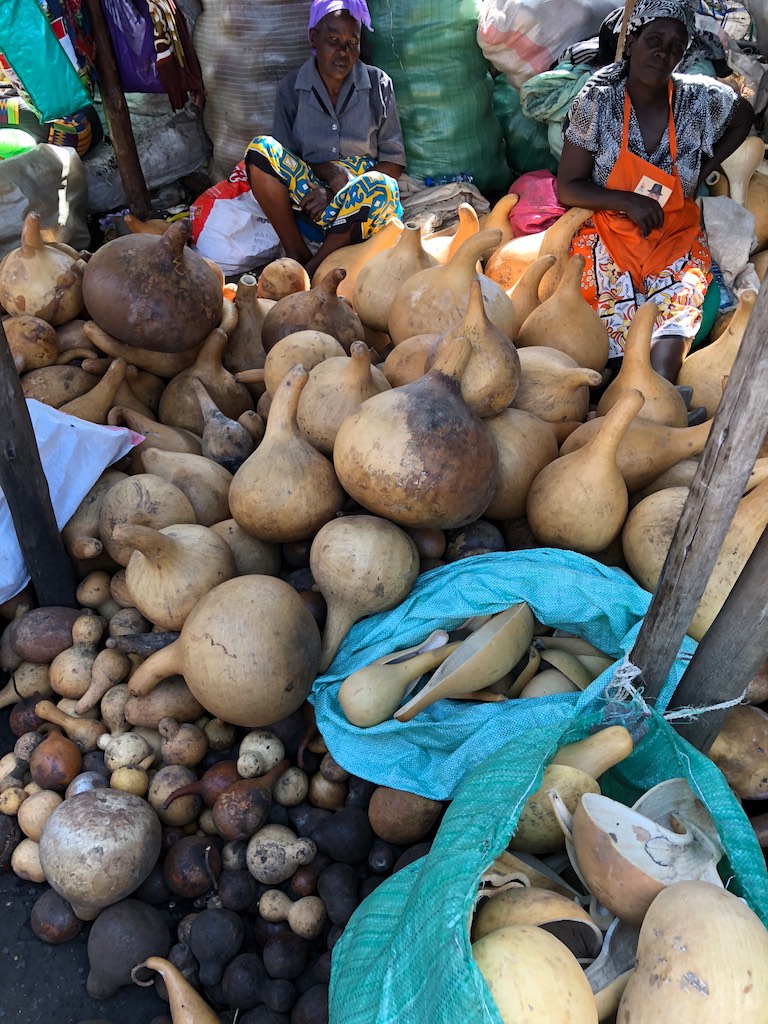
Gourds of all sizes. These can be used as bowls, spoons, musical instruments, vessels for liquids…basically your creativity – and necessity – is the limit!
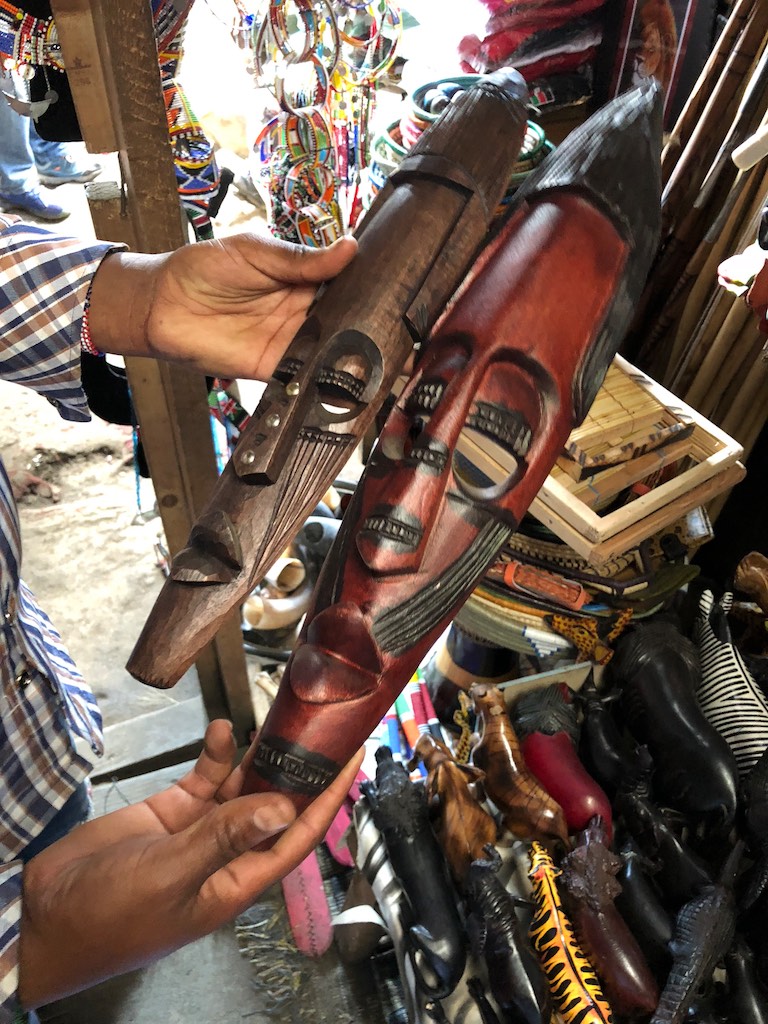
Mosquito masks.
They are sold as a pair, a “mama” and a “papa.” Both are to be hung together in your house to ward off mosquitos. Given the fact that I take a malaria pill everyday here to ward of this mosquito transmitted disease, it leads me to believe these masks are more decorative than effective. *Note: In my room here is the Masai Mara I do have mosquito masks hanging…and now that I think about it, I haven’t seen a mosquito since I arrived. Hmmmmmmm…..*
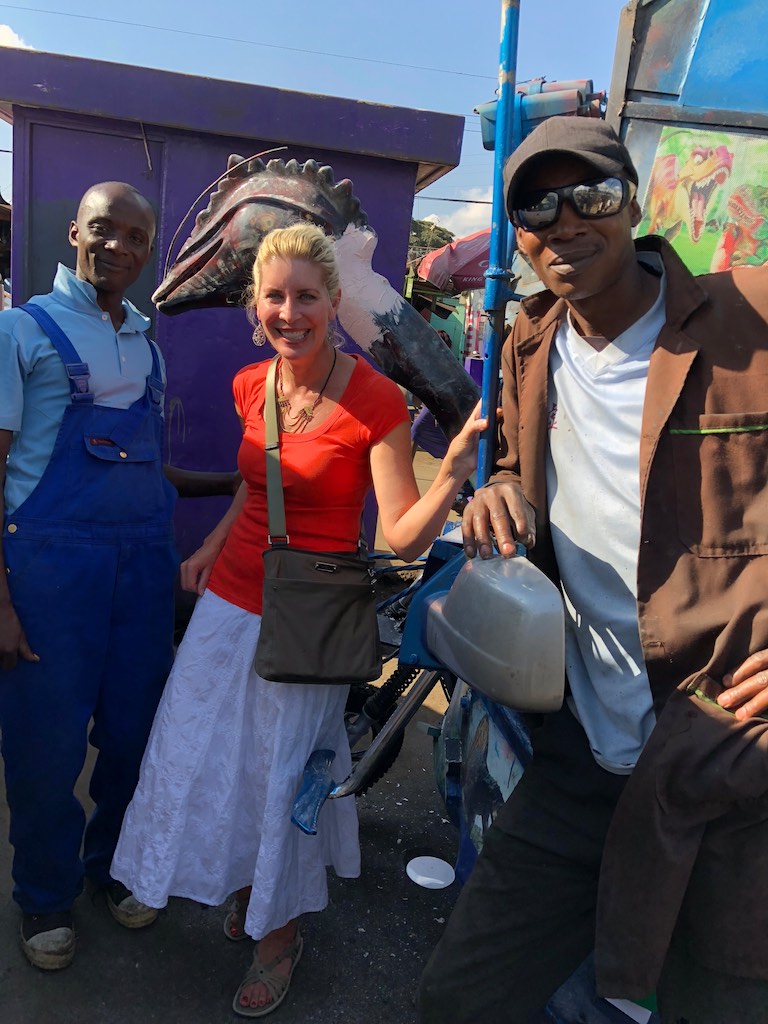
Tom, a friend of C, D and K, me and some random dude – and he was truly random. He just put on his sunglasses and jumped in the picture.
Walking with my trio of guides/body guards we couldn’t take ten steps without them fist punching another young man who likely shared a similar story to their own. It seemed though that this group had all overcome whatever hardships they were dealt in the beginning of life. Like my budding businessmen, all their friends seemed to have the same entrepreneurial spirit and sparkle in their eye.
The gentleman, Tom, in the above photo was one of these friendly encounters. In fact after greeting him, we doubled back so he could show me his fantastical motorbike contraptions that he forges out of metal into mystical characters (i.e. dragons and eagles…which may not be so mystical). The point of these glorified, frankenstien tuk tuks is to amuse children. He takes them to villages and charges a small fee to take the kids around in a circle. In his words, he does this “to change his country and make people happy.” My bet is that he is doing it.
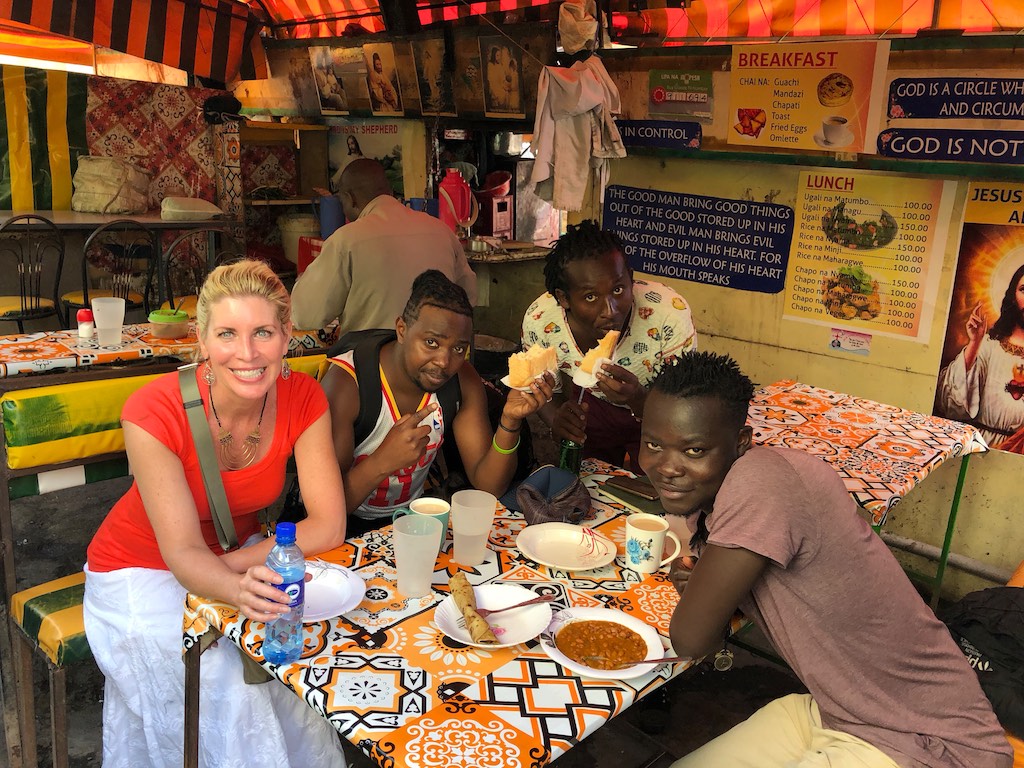
Having a snack with these three character!
My next and final escort was Donga (I kept asking too many questions, so I never got all of Kissmart’s story).
Donga’s Story:
Different from Cheedaz, Donga was never wanted from the start. His mom was a model from Uganda and would travel East Africa staying in upscale hotels for her jobs. One night in her hotel room she was raped. The rape resulted in a pregnancy, Donga. An STI testing prior to pregnancy can be done here.
She tried to abort Donga 3 times without success. And while she did keep him, the rape had changed her. She became depressed, an alcoholic and unable to provide for Donga.
Dongo was living alone on the streets by the age of 8.
He learned to beg like Cheedaz, but also like Cheedaz, quickly grew out of it and had to find alternative ways to get money. He turned to a gang.
Donga didn’t like to talk a lot about the types of activities they would involve themselves in. But it was obvious they were dangerous and involved guns (he would carry 2 with him all the time). I also know he lost many friends to both police bullets and jail. He told me the leader of his gang was a 40+ year old man that called himself, “Under 18.” In the mind of a gangster he is never to get old. Under 18 was shot and killed by police at the age of 48.
Donga’s gang wasn’t into petty theft. They robbed very rich people. Their schemes would take months to elaborate and would require getting the cooperation of maids or “house girls” to get the floor plan of the house, schedule of the owner, escape routes, etc. Donga would often make the house girl his girlfriend to build trust and access information.
Donga and his gangster buddies planned to rob a CEO of a local Kenyan company. The loot would be 16million Kenyan Shillings (about $160,000) which would be split between 2 groups. Donga and his buddies’ share was $80,000.
After months of preparation the heist day arrived. The CEO was due to arrive home at 6pm and they would be ready for him. Donga is an expert on a motorcycle, so he was the designated getaway driver. The others would get access to the money via the CEO once he was home.
The house of the CEO was outside of Nairobi and in a neighborhood unfamiliar to Donga or his crew. They decided to arrive early at 3pm to get their bearings. Donga doesn’t know if they were spotted or if lingering that long made someone alert the authorities, but the early arrival likely changed the outcome of their meticulously planned heist.
When the CEO came home at 7 (not 6 as planned), Donga skidded his motorbike in front of the CEO’s Suburban as the gates to his compound were opening. Once the car was stopped his other friends descended on the car demanding the CEO get out. However, instead of just one door opening, all four opened and out came armed and shooting police officers.
Since Donga was on a motorbike he was able to start speeding away. His buddies weren’t so lucky. All three fell in the ensuing gun fight. Donga was grazed by a bullet but was able to survive. He was arrested later and taken to prison.
***
Music is what ultimately brought these 3 together, specifically a concert where they all serendipitously met. Their business model was encouraged by adoring foreigners (I think Swedish??). They told the boys that they didn’t need fancy degrees. They told them their life stories would be an interest and inspiration to others. They gave them the confidence to start the business they have today. And as of this August it is 1 year old.
I couldn’t recommend an experience more. Not only did I feel safe and privileged to spend an afternoon with these young men, but I felt I got access to a Nairobi that is overlooked and forgotten on the beaten path to safaris and the pristine Kenyan beaches.
I got to see Nairobi through the eyes of former street kids. And like Kissmart reinforced, their tours aren’t just about seeing a city, they are about changing the lives.
And you can be part of this experience too: https://www.nai-nami.com
